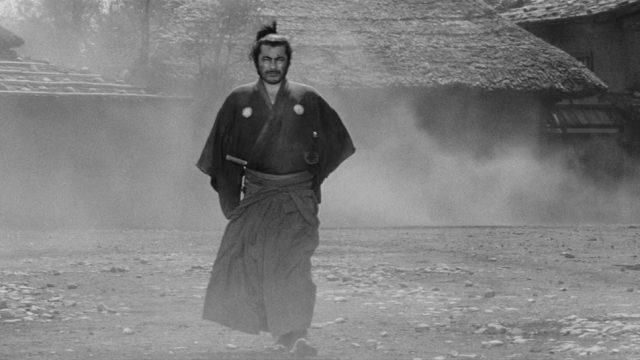One man approaches ten, as dust blows dramatically. The two opponents—one ronin, one criminal gang—step closer and closer, their confrontation just moments away. The music is simple, rhythmic, tense. One motif is as sharp and urgent as a ticking clock. Finally, a gang member cries, “Don’t come any closer!”
And then, the Yojimbo smiles.
He attacks, and the music crashes to life in his wake, with the thumping, invigorating main theme that underlies many of the action sequences. It keeps much of the traditional Japanese influences of the simpler theme that precedes it, but it escalates with more energy and a strong melody, backed by Western big band horns. When the Yojimbo makes his critical move — a knife throw that disables his greatest opponent — the score drops out again; it’s done its work. The violence is over, with nine men dead or dying, in less time than all that buildup took.
His immediate work done, the Yojimbo turns to the lone, terrified survivor. In a nod to the film’s opening, the Yojimbo orders him to “Go home to your mother and live a long life eating gruel.” The young man runs.
For the grimness of its subject matter — a rivalry that leads to dozens dead and a town in ruins, women kept as slaves, entire family lines wiped out, madness — Yojimbo is a very funny movie. Masaru Sato’s score runs throughout as a wry, running commentary. Toshiro Mifune, who never saw a genre he couldn’t conquer, has crackerjack comic timing, and can say more with a raised eyebrow than some actors do in their whole careers. And as the cast around him — grasping thieves, toxic families, a desperate family, and one absolutely disgusted barkeep — do their best to keep up with the changing rivalries and rapidly mounting corpses, most of them get moments of humor as well. Ironic and pitch-dark humor, sure, but that’s how it is sometimes.
There are, of course, plenty of other Japanese classicscanons that turn on a dime or that use black humor to their advantage, but Yojimbo’s grim humor was and remains particularly influential, from A Fistful of Dollars just a few years later, to the present day. (Remember Kill Bill’s “Go home to your mother!”?) Much of Kurosawa’s filmography is balanced between influence and inspiration, taking Western (and other) sources, making them new, and then having them borrowed, or stolen, in return. Kurosawa cited Dashiell Hammett’s The Glass Key as a major inspiration for the movie, and the author’s Red Harvest shares many similarities as well, right down to the nameless protagonist. (Here’s another instance in which that excellent soundtrack backs up the movie’s themes; Sato claimed Mancini as an influence on Yojimbo, and those brassy Big Band horns are another nod to postwar Western noir). Kurosawa’s genius was to take themes from the world around him, set them in remarkably specific times and places, and craft them into narratives so compelling that other artists steal from them for decades.
There’s probably a lot to say as well about how even something as culturally specific as humor can be shared across nations and eras, especially humor borne from resisting systems designed to crush and de-humanize us (the lawlessness of the Old West, the failing days of feudalism, life under a dying capitalist system). The village in Yojimbo certainly isn’t the first place, or the last, where cynicism starts feeling like the only option and the only path out.
One of the continued strengths of Yojimbo is that Kurosawa refuses to leave the narrative in darkness. As Sam points out in his essay, the Yojimbo’s humanity and reluctant kindness cuts through the darkness, freeing the few honest townspeople left. (Though that brightness doesn’t last long; before the Yojimbo leaves the ruined town, he tells one of the complicit survivors to hang himself, and there’s no saying what will happen to the town, now stripped of industry and abandoned by most of its populace.) Underneath the clashing percussion and the mocking humor of the brass, there’s heart in Yojimbo, broken and struggling, but still hanging on.
Bonus tracks:
Check out the Chicago Reader for more on Yojimbo’s soundtrack and the work of Kurosawa’s collaborators, Sato and his mentor Fumio Hayasaka.
If you’d rather talk about the damning effects of cycles of vengeance, Natalie Wynn touches on the subject and the human craving for ‘poetic justice’ in her recent “Justice (Part 1)” video.

